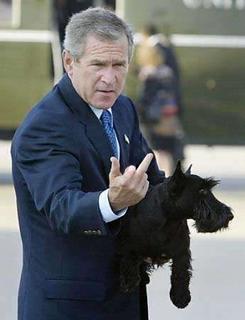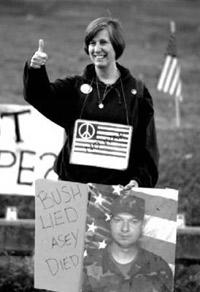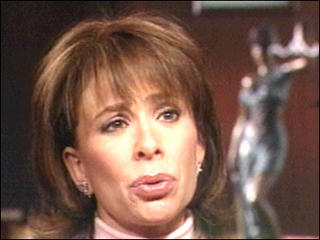(The Washington Post) Rising gas prices and ongoing bloodshed in Iraq continue to take their toll on President Bush, whose standing with the public has sunk to an all-time low, according to the latest Washington Post-ABC News poll.
The survey found Bush's job approval rating at 45 percent, down seven points since January and the lowest ever recorded for the president in Post-ABC surveys. Fifty-three percent disapproved of the job Bush is doing.
The war has been a drag on Bush's presidency for many months, but his Iraq approval ratings in the new poll were little changed from two months ago, despite widespread violence, a rash of U.S. casualties, antiwar protests outside the president's Texas ranch and a growing debate about reducing U.S. troop levels.
What may have pushed Bush's overall ratings down in the latest poll is pervasive dissatisfaction over soaring gasoline prices. Two-thirds of those surveyed said gas prices are causing financial hardship to them or their families. Gas prices stand to go even higher after Hurricane Katrina's rampage through the oil-rich Gulf of Mexico.
More ominously for the president, six in 10 Americans said there are steps the administration could take to reduce gas prices. Slightly more than a third say the recent run-up has been due to factors beyond the administration's control.
"I supported him last year," said Gina Coleman, 29, a homemaker living in Camden County, N.J. "I wouldn't vote for him again. It's gas prices, the war -- just the way he has been handling things.
The rise in gas is something that has been happening for a long time, and the prices are getting worse. This makes me feel more negative about him, definitely."
Bush also received negative marks for his handling of immigration, the economy and Social Security, although his ratings on the latter two were not as low as they were two months ago. A majority of Americans supported his handling of the campaign against terrorism.
Bad news for Congress, Democrats, tooThe poll numbers paint a portrait of national frustration with the direction and leadership of the country, which, if not reversed in coming months, is likely to color the environment for next year's midterm elections, putting incumbents in both parties on the defensive.
Dissatisfaction is not limited to the president. Fewer than four in 10 Americans -- 37 percent -- approve of the way the Republican-controlled Congress is doing its job, the lowest rating for lawmakers in nearly eight years.
The survey also provided bad news for Democratic leaders, who are judged as offering Bush only tepid opposition. Slightly more than half of those surveyed expressed dissatisfaction with congressional Democrats for not opposing Bush more aggressively.
Self-identified Democrats were particularly impatient. More than three in four said congressional Democrats have not gone far enough to oppose Bush on Iraq or on administration policies in general.
"Somebody needs to speak up," said Michelle Burgess, 41, a home health aide in St. Louis. "Enough is enough. I don't understand why we're over there in Iraq or what he's doing on other issues. There are too many lives being lost."
Independents were similarly dissatisfied with Democratic leaders for not challenging the president over the war and other issues, with six in 10 saying Democrats have been too meek.
Public attitudes toward the war have not changed significantly since the first of the year, the poll found. Slightly more than four in 10 -- 42 percent -- approved of the job Bush is doing in Iraq; 57 percent disapproved, unchanged in recent months. Slightly more than half -- 53 percent -- said the war was not worth it, while 46 percent said it was, identical to the results of a Post-ABC poll two months ago. By a 51 percent to 38 percent ratio, the public said the United States is winning the war, despite mounting casualties and insurgent attacks.
A majority (54 percent) continued to say the United States should keep military forces in Iraq until civil order is restored there; 44 percent said U.S. forces should be withdrawn. Six in 10 opposed announcing a timetable for withdrawal. Only about one in eight -- 13 percent -- said U.S. forces should be withdrawn immediately.
Michael Strickland, 31, a factory worker who lives in Pine Bluff, Ark., said he opposed the war before the United States invaded in March 2003: " It's just another Vietnam. . . . No matter what we do over there, they are going to kill us."
His solution: withdraw -- but not immediately. "Don't tell them when we're going to leave. . . . But do it in a reasonable time frame -- six months to a year. Even if we leave, it can't get any worse over there."
These ambivalent feelings about the war and Bush's policies in Iraq are felt even by many of his supporters who continue to back the U.S. invasion.
‘Really mixed feelings’"I have really mixed feelings, like probably the whole country has," said Wayne Almlie, 51, a warehouse worker and part-time pastor in Des Moines, who said he approves of Bush's overall performance. "We need to stay the course. I really think we do. The whole region would disintegrate if we would pull out. . . . I'd hate to have to be making those decision."
Despite escalating bloodshed, the struggles to approve a draft constitution and the well-covered antiwar protests led by Cindy Sheehan, whose son was killed in Iraq, the survey found little evidence that antiwar sentiment has increased the past two months.
The survey also found that Sheehan, who has been protesting the war outside Bush's ranch near Crawford, Tex., has become the most visible symbol of the antiwar movement. Fully three in four Americans have heard or read about her.
Sheehan met last year with Bush at an event for military families and has been seeking another meeting with him. Slightly more than half of the country -- 52 percent -- said Bush should meet her again; 46 percent said he should not. Fifty-three percent supported what she is doing and 42 percent opposed.
The poll found that opposition to the war has deepened among Democrats. Two months ago, two in three Democrats said they strongly disapproved of Bush's handling of Iraq; that has risen to three in four. Over that same period, the proportion of Democrats who described themselves as "angry" over Bush's Iraq policies has risen from 36 percent to 46 percent.
The poll found that Sheehan's activities may have helped increase support for the war among Bush supporters. Although eight in 10 Americans said Sheehan's protests have not changed their attitudes toward the war, one in 10 said she has made them more likely to support the conflict -- the same proportion that said she has made them less likely to support the war.
A total of 1,006 randomly selected adults were interviewed by telephone Aug. 25-28. The margin of sampling error for the results is plus or minus three percentage points.
Assistant polling director Claudia Deane contributed to this report.
© 2005 The Washington Post Company























